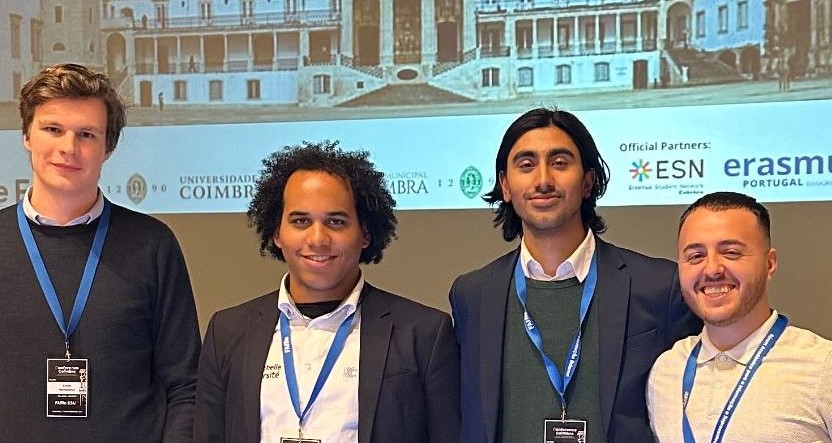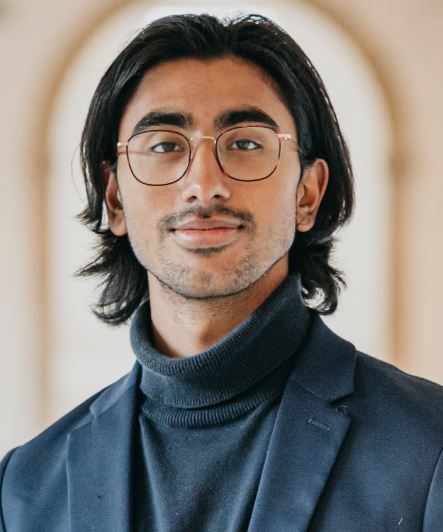Sukh Preet Singh is studying Biomedical Laboratory Technology at HOGENT and is a student representative at the Department of Healthcare. In his own words, he is interested in "everything related to external operations and internationalisation." So the fact that he is part of the HOGENT internationalisation council and that he was the only student to represent HOGENT at the European Student Union (ESU) congress is by no means a coincidence. You certainly don't need to convince him of the added value of the European University Alliance U!REKA, of which HOGENT is a partner organisation.

The European Student Union is supported by the European Commission and is an umbrella organisation for student councils within the already existing European University Alliances (EUA). The organisation brought together students from all over Europe at its very first conference, from 7 to 10 December in Coimbra, Portugal. For a start-up EUA such as U!REKA, an event like this can be particularly useful, as some of the now more than 50 university alliances have been active for several years and can therefore share experiences of success, but equally of growing pains and how to deal with them.
This has been Singh's experience too: "I got to know a lot of European students and the alliances they represent there, gathering and exchanging good practices, but equally pains. I gained a lot of useful knowledge there," he says. He at the same time emphasises the importance of such physical events: "You can do a lot online, but the added value of getting together physically from time to time cannot be underestimated.
Strong participation policy
Among other things, Singh found that HOGENT is a role model in terms of student participation. "HOGENT has a strong reputation on participation and that is fully justified. From the many conversations I had at the conference, it appears that a lot of universities are not at all that far."
This is of course the reason why HOGENT is the pioneer within U!REKA in developing a policy on (student) participation. Singh, too, is involved: "We have worked out a first joint draft concerning student participation and how to organise it. In the coming months, the partner institutions will discuss this internally and come up with possible adjustments. The aim is that by June 2024, we will be able to present a final proposal."
This is not an easy task, he experiences: "Each partner institution handles student participation differently. At most institutions, for instance, it is obvious that student representation should be separate from political parties, whereas at Frankfurt University of Applied Sciences, representatives are elected from student sections of political parties."
Similarly, the principle of proportional gender representation, which has been in place at HOGENT for a long time, is unknown at some other U!REKA partners. In addition, very clear agreements also need to be made about representatives: will they be elected, and if so, how often and how do you organise elections?
How many members should such a European student council have? How frequently should meetings be held, and will they be organised online or physically? And if physical: how can the travelling be sustainable?
What's in it for the students?
The question is whether Singh, as a student with an international focus, is not an exception. In other words, most students are not enthralled by that European narrative. How can you get them into it?

HOGENT has a strong reputation on participation and that is fully justified. From the many conversations I had at the conference, it appears that a lot of universities are not at all that far.
Sukh Preet Singh
student representative Healthcare Department
"International collaboration and learning broadens your worldview. That in itself could be an argument," Singh argues. In any case, he believes that opportunities for mobility and more flexible curricula are a great asset, which should be strongly highlighted."In the future, thanks to the U!REKA alliance, it will be possible for a U!REKA-student, for instance, to take certain curricular courses at a partner institution," Singh believes. "One of the targets of U!REKA is that half of the students will have participated in some kind of international mobility within the partnership by the end of 2027. In addition, more collaborative projects will be set up, both within education and research, which often lead to unique experiences and are sure an added value to your later career."
Providing students with more information about this powerful international dimension and making it clear how unique it is could be a way to get them on board with the U!REKA narrative, according to Singh: "I can see that HOGENT is already strongly engaged internationally, but many students are not aware of it. We need to do something about that, because I am convinced that this international dimension, which is now getting much stronger thanks to the U!REKA European University Alliance, can be extra attractive to students."

